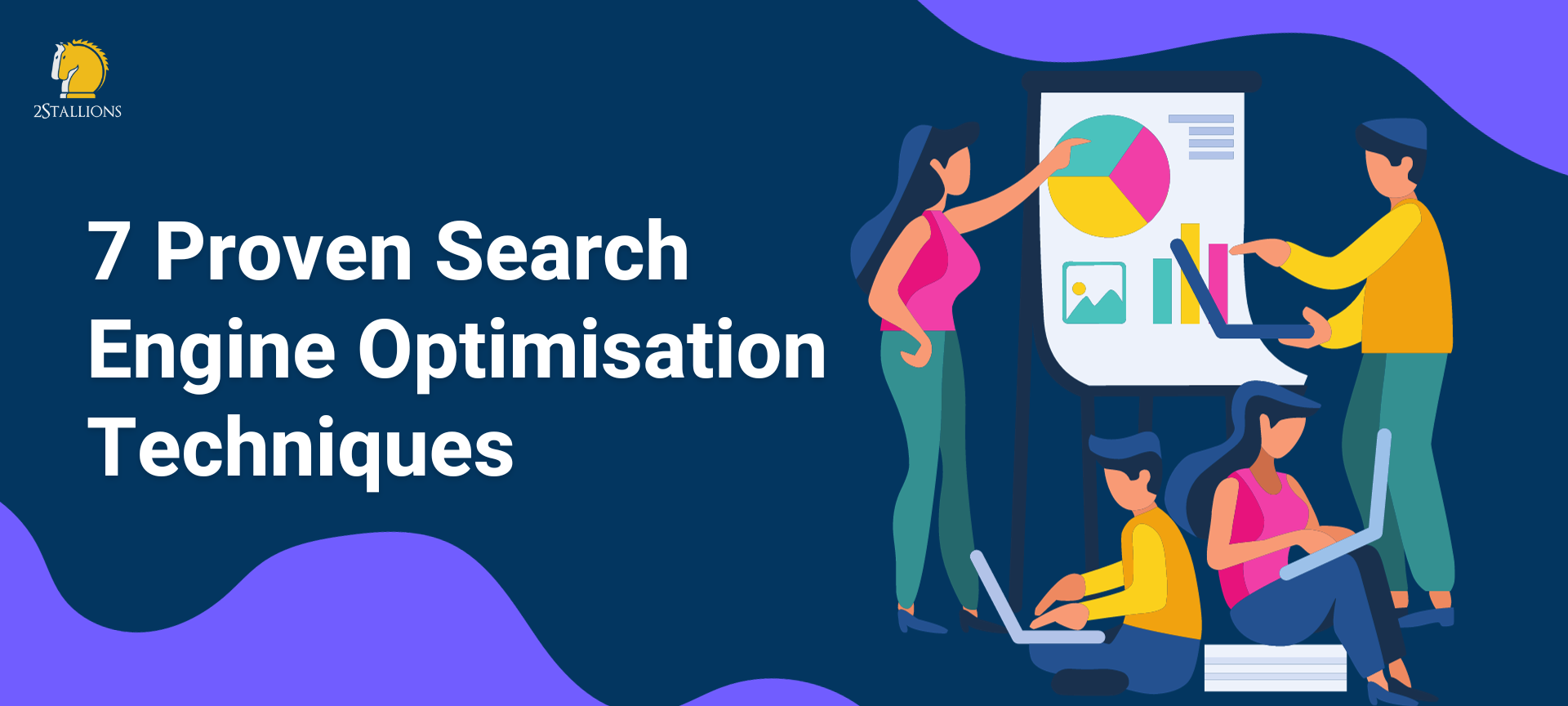SHARE

Search engine optimisation (SEO) has become essential to any successful online marketing strategy in today’s digital landscape. With billions of websites vying for attention on search engine results pages (SERPs), it’s crucial to understand the importance of SEO and how it can impact your online visibility.
In this article, we will explore seven proven SEO techniques that can help boost your website’s rankings and drive targeted traffic to your digital doorstep.
[thrive_leads id=’8302′]
Understanding the Importance of SEO
SEO, which stands for Search Engine Optimisation, plays a critical role in digital marketing by improving your website’s visibility in search engines like Google, Bing, and Yahoo. It involves various strategies and techniques to optimise your website’s content, structure, and technical aspects.
The ultimate goal is to increase your website’s chances of appearing higher in search results when someone searches for keywords related to your business or industry.But why is SEO so important? Imagine having a beautifully designed website with great products or services, but no one can find it. That’s where SEO comes into play. By implementing effective SEO practices, you can ensure that your website is easily discoverable by search engines and, consequently, potential customers.
The Role of SEO in Digital Marketing
SEO is not just about ranking higher on search engine results pages; it goes beyond that. It’s about attracting the right audience to your website – people genuinely interested in your offer. To achieve this, it’s crucial to understand your target market and their search behaviour.
By conducting thorough keyword research and analysing search trends, you can gain valuable insights into what your target audience is searching for. Armed with this knowledge, you can optimise your website’s content, structure, and user experience to align with their needs and interests.
When done right, SEO helps drive relevant traffic to your website, increase brand awareness, generate leads, and boost conversions and sales.For example, let’s say you own a small bakery in London. Through SEO, you can identify the most popular keywords and phrases related to bakery products and services in your area.
By incorporating these keywords strategically into your website’s content and meta tags, you increase the likelihood of your bakery appearing in search results when someone in London searches for “freshly baked bread” or “best cupcakes in town.”
How SEO Impacts Your Online Visibility
When was the last time you clicked on the second page of search results? Chances are, it’s been a while. Studies show that the majority of users rarely venture beyond the first page of search results, making it vital for your website to rank well. Think about it – when you search for something online, you want to find the most relevant and reliable information quickly. Search engines like Google understand this, which is why they strive to deliver the best possible results on their first page.
By implementing SEO techniques, you can improve your website’s visibility, making it more likely to attract clicks and visits from potential customers. Moreover, appearing on the first page of search results also enhances your website’s credibility. Users tend to trust websites that rank higher because they perceive them as more authoritative and trustworthy.
This increased credibility can significantly impact your online presence and reputation. So, whether you’re a small local business or a global corporation, investing in SEO is crucial for improving your online visibility, attracting organic traffic, and staying ahead of your competitors.
The Anatomy of a Well-Optimised Website
Now that we understand the importance of SEO let’s dive into the key elements that make up a well-optimised website. When it comes to website optimisation, one of the crucial factors to consider is the structure of your website. A well-structured webpage makes navigating easier for users and helps search engines understand and index your content.
Organising your website into logical categories, using descriptive URLs, and implementing a clear site hierarchy make it easier for search engines to crawl and rank your web pages. Imagine you are visiting a library with thousands of books. Finding the book you are looking for without proper organisation would be daunting.
Similarly, search engines need a clear structure to efficiently navigate through your website and understand the relationship between different pages. By categorising your content into relevant sections and using descriptive URLs, you provide search engines with valuable information about the topics covered on your website. This helps search engines determine the relevance of your pages to specific search queries, increasing the chances of your website appearing in search results.
Furthermore, a clear site hierarchy ensures that search engines can easily identify the most essential pages on your website. Just like a well-organised table of contents in a book, a well-structured website hierarchy guides search engines to the most significant and relevant content, improving the overall visibility of your website.
Mobile Optimisation and SEO
In today’s mobile-first world, optimising your website for mobile devices is no longer an option; it’s necessary. With the increasing use of smartphones and tablets, ensuring that your website looks and performs well on these devices is essential, providing a seamless user experience.
Imagine visiting a website on your smartphone only to find that the text is too small to read, the buttons are too close, and the overall layout is distorted. Frustrating, isn’t it? This is why mobile optimisation is crucial for SEO success. When your website is optimised for mobile devices, it adapts to different screen sizes and resolutions, ensuring that users can easily navigate and interact with your content. This improves user satisfaction and encourages them to spend more time on your website, reducing bounce rates and increasing the chances of conversions.
Moreover, search engines recognise the importance of mobile-friendly websites and give preference to them in their rankings. If your website is not mobile-friendly, it may not rank as high in search results, resulting in significant organic traffic loss.Mobile optimisation involves various aspects, such as responsive design, fast loading times, and touch-friendly navigation. Implementing these elements creates a user-friendly experience across all devices, enhancing your website’s visibility and SEO performance.
Website structure and mobile optimisation are two essential components of a well-optimised website. By organising your content effectively and ensuring it performs well on mobile devices, you can improve your website’s visibility in search results and provide an exceptional user experience. Remember, a well-optimised website is beneficial for search engines and the users who visit it.
Keyword Research and Its Significance
Keywords are the foundation of SEO. They are the words or phrases that users enter into search engines when looking for specific information, products, or services. By conducting thorough keyword research, you can identify the terms your target audience is using and optimise your content accordingly.
The Art of Finding the Right Keywords
Keyword research involves identifying keywords with sufficient search volume, relevance to your business, and manageable competition. Understanding the search intent behind different keywords allows you to create content that aligns with your audience’s needs and questions. Tools like Google Keyword Planner and SEMrush can help you discover relevant keywords and their search metrics.
Long-Tail Keywords and Their Benefits
While short, generic keywords are highly competitive, long-tail keywords offer a great opportunity to rank higher and attract more targeted traffic. Long-tail keywords are longer, more specific phrases that users use when they clearly know what they’re looking for. By optimising your website for long-tail keywords, you can capture highly qualified leads, increase conversion rates, and stand out from the competition.
The Power of Quality Content in SEO
Content is king in the world of SEO. High-quality, engaging content attracts and retains visitors and signals to search engines that your website is authoritative and trustworthy.
How Content Affects SEO Rankings
Search engines prioritise websites that offer valuable, relevant, and fresh content. By creating informative blog posts, in-depth articles, and engaging videos, you can establish yourself as an industry thought leader and improve your website’s visibility. High-quality content encourages other websites to link back to your pages, boosting your SEO efforts.
The Role of Content Freshness in SEO
Search engines love fresh content. Regularly updating your website with new blog posts, product updates, or industry news signals to search engines that your website is active and up to date. You can consistently deliver fresh and valuable content to improve your website’s crawl rate, indexation, and search engine rankings.
[thrive_leads id=’8310′]
Building Backlinks for Better SEO
In addition to high-quality content, building backlinks is another crucial SEO technique. Backlinks are links from external websites that point to your website. These links act as “votes of confidence” to search engines, indicating that your content is valuable and worth ranking higher.
Understanding the Value of Quality Backlinks
While the quantity of backlinks is necessary, quality matters even more. Search engines prioritise links from authoritative, relevant websites. By earning quality backlinks from reputable sources, you can enhance your reputation, improve your website’s authority, and increase its visibility in search results.
Strategies for Effective Link Building
Effective link-building involves a combination of outreach, relationship-building, and creating valuable content. By reaching out to relevant websites, offering guest posts, or participating in industry forums, you can attract natural backlinks that strengthen your website’s SEO. Link building is not a one-time task but an ongoing process that requires consistent effort and dedication.
In conclusion, search engine optimisation is a vital aspect of any digital marketing strategy. These seven proven SEO techniques can improve your website’s visibility, attract targeted traffic, and outshine the competition. SEO is an ongoing process that requires continuous effort, monitoring, and adaptation to ever-evolving search engine algorithms.









